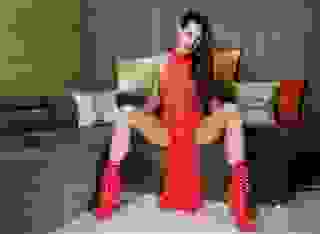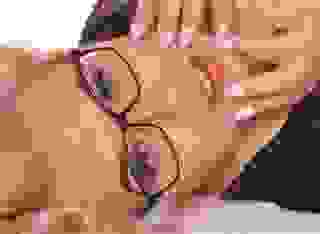Note: You can change font size, font face, and turn on dark mode by clicking the "A" icon tab in the Story Info Box.
You can temporarily switch back to a Classic Literotica® experience during our ongoing public Beta testing. Please consider leaving feedback on issues you experience or suggest improvements.
Click here"Do you think what we saw is real?"
"I didn't. No, not at all. I thought I was going mad. And then you saw him. And you know what? -- how can two people who've never met share a single, contemporaneous hallucination?"
"I don't think it can happen -- but I'm no professional when it comes to those kinds of things." He sighed. "Deborah, that's not what I'm talking about. What led you to the edge in the first place? I mean, not every lonely person..."
"Oh, are you so sure? I'm not anymore, Sumner. Loneliness is a silent killer. It chews away at the edges of your soul every waking moment of your life. Whether you choose to live alone or life came at you head on and somehow crushed you, loneliness is only tolerable for just so long. Sooner or later it forces subtle changes throughout every aspect your life, it serves up crushed expectations that wear you out, beat you down. The grayness of a winter's afternoon comes to define your life and you can't see beyond the curtain to Spring anymore."
"Did you ever try anti-depressants, anything like that?"
"Sure, why not try them? Still, those things can't take away the silence that stalks you, the coming home at night to an empty flat, to an empty life. Oh, the hobbies I've read about, my heavens, they're a panacea, aren't they, each and every one of them. I tried knitting for a time, then quilting, but then I'd look up and see my living room walls looking at me, accusing me..."
"Of what?"
"Of being alone."
"You say that as if it was a choice."
"It is, in a way. You go out and your expectations are dashed time and time again, and then you go home and tell yourself that you're different somehow. That people look at you differently for a reason. That you're marked..."
"Marked?"
"I don't know how else to explain it, Sumner...Sumner? Didn't that name come from summoner? The person who summoned people to church?"
"I think so. Why?"
"Well, that made me think about John, about when I was up there yesterday, when he told me Sumner was coming. You see? That I was up there, being summoned?"
"Oh. And now?"
"He was telling me you were coming. It can't mean anything else."
"So, what if he was. What does that mean?"
"He stopped me. The wind stopped me, blew me from the edge. The same wind that knocked your boat on it's side -- it hit me when I was looking over the edge, knocked me down and blew me away from the edge, and he was laughing then, a happy laugh, but he was laughing."
He shook his head, lost within the inward confines of her vision, not sure if she was mad -- or if he was now going completely off his rocker. "So, let me get this straight -- in MY head. You went up to the cliffs yesterday because you've been lonely, for a long time..."
"Yes. I'd say almost twenty years, anyway."
"Well, I was in your shop this morning and it seems to me you're surrounded by people -- men and women, by the way -- who simply adore you..."
"That's the role I play in their lives, Sumner. The role they're comfortable with, by the way. And yes, men flirt with me all the time, but I tried that once -- and in the end I simply lost a customer. People buy into all kinds of fantasies, and the doting waitress is one of the oldest, but that's a fantasy that simply doesn't work out over time. It didn't for me, anyway, and in the end I was left lonelier than ever."
"Yes, I suppose there's fantasy and reality..."
"Yes, and when you paste your fantasy over the reality of someone else's life, what you end up with is dashed expectations, a bitter lot of pain."
"So, then wind that knocked me and the boat over...knocked you off your feet and away from the drop-off? That means something in this alternate universe we've stumbled upon..."
"This what?"
"Just a manner of speaking, I think. But I can't account for what I saw up there today. That man's been gone forty years, so either we're interacting with death -- or with an artifact of Time itself. Or both."
"Are you retired?"
"Yes, why?"
"What did you do?"
"I worked in government, the State Department. Embassy security, but I was in D.C. most of the time, then I worked in the private sector for about ten years. In Boston, by and large, where my wife was from."
"What kind of work is that? I mean..."
"Counter-terrorism. Especially after 9/11, but I was on the ground in Tanzania, in 1998."
"What awful work."
"Yes, it was. My wife was in the Navy, then continued to work for them after she retired, so in a way we both lived and breathed that stuff all our lives."
"Poison. For the soul, I mean."
"I think so, yes. I think the stress poisoned her, made her ill."
"That kind of hate poisons everyone and everything," she said. "Tell me. Do you think you're running away from all that now. Is that what this boat's all about?"
"Oh, yes, definitely. I think we both wanted to run away from it all, while we could. But..."
"...time caught up with her?" she added.
"With us both, yes."
"So, have you been alone since..."
He nodded his head. "Yup."
"So you know what I'm talking about, don't you?"
He looked into her eyes. "Yes."
"Have you ever thought about..."
"In a way. After Charley passed."
"How long ago was that? Less than a year?"
"Yup, just a few months, really."
"So, maybe I'm here, now, to keep you from..."
"Perhaps, but when I saw you in the café I thought there was something special about you."
"Did you? Why did you walk out?"
"I don't know. I felt superfluous, but..."
"Maybe because, what did you say, you thought there was something special about me? Do you think that put you off?"
"Maybe."
"That's what I was trying to get at," she said. "Loneliness becomes self-reinforcing. I think we get to a point where we take unconscious actions to reinforce our loneliness -- and we're not even aware, on a conscious level, anyway -- that's what we're doing."
He nodded his head. "I can see that, but that doesn't even begin to get at why a dead guy was up on the cliff, grinning at me."
And certainly not what he was most afraid of.
"No, it doesn't. Wanna take a shower with me?"
"You know? Yes, I do..."
"But?"
"No buts, Deborah."
"Really?"
He kicked off his Top-siders and went into the head and turned on the priming pump, then the water and the sump pump, and she walked in beside him -- naked as the day she was born. He had to force himself not to stare...her breasts were perfect, her legs gorgeous...then she stepped into the shower and let the water run through her hair -- watching him while he undressed. When he stepped into the shower she leaned in and held him for a moment, then put her hands on his shoulders, pushed him down to his knees. She put one foot up on the rim of the enclosure, then took his head in her hands and pulled him to her need.
Her eyes closed as her head tilted back, and she felt his hands on the backs of her thighs pulling her closer still. The hot water running down her back, his powerful hands almost electric and oh! -- he hadn't forgotten a thing, had he?
+++++
He heard something bump against the hull in his sleep and his instincts kicked in: his eyes opened and he slipped out of the berth, saw the sun just coming up through a forest of masts as he got into his shorts and shoes, then he went forward and checked the panel breakers. Nothing amiss -- so he went topsides and checked all the dock-lines -- and found nothing unusual there, either. He looked forward and...
He was sitting on the pulpit, his legs crossed and that guitar resting on his lap.
Collins walked forward quietly and Lennon looked down, played a few notes slowly, tentatively, then started into a gentle acoustic rendering of Fixing A Hole, changing 'where I belong I'm right' to 'where you belong you're right' just once, and when he finished he looked up at Collins and grinned.
"Any questions, mate?" he said, looking over his glasses.
"Yeah," Collins said, stepping forward almost defiantly, "a few dozen come to mind." Lennon smiled, bent to his guitar and began a slow, dirge-like Yesterday, and Collins fell to the deck, choking off a cry. "No, please, don't do this to me," he managed to whisper between gasps for breath, but Lennon played on through to the last few notes, then he looked up at Collins and saw him crumpled on the deck.
"You can't keep runnin'. One of these days you've got to see the meaning within our moment together. Remember?"
Collins looked up -- but Lennon was fading from view again, bent over his guitar, feeling his way through the music of the spheres.
"Wait! Don't leave, not yet..."
But he was gone.
"...not again!"
+++++
The twins, Phoebe and Sumner, had grown up in a house full of music, music everywhere, all the time. His mother, a truly sensational pianist, had assiduously passed on her gifts, but the boy's twin sister had always been the intended recipient -- and he grew to more fully understand that attachment as he watched mother and daughter play and study together. He grew technically competent over the years -- while his sister played music from the heart. Even so, figuring out exactly where the line between those two heart's lay was a mystery he never penetrated. There was a force joining mother and daughter he simply couldn't fathom. And he never did.
One evening, while walking home with their parents after a late dinner, they heard four or five 'pop-pop-pops' as they approached and as he looked at his sister he wondered what it was. His father was anxious, protective, and when they came to their building he saw a lot of people running around, everyone shouting and lots of people crying. He remembered a man sitting on the sidewalk saying he'd just killed John Lennon, then he saw the man laying on the stairway into their building, foamy blood bubbling from his mouth, and he'd reached out, tried to comfort the man -- but his father had reached down and scooped him away. But what he'd remembered most was looking at the man as he reached up...for his hand...and the lingering warmth in the man's eyes as he struggled against the night.
From the time they grew into this life within their mother's womb, the twins had been tentatively, yet securely joined in the most oblique ways. They looked eerily alike but couldn't have been more different in their approach to life -- and the world, and as they grew older, the wider this apparent gulf became. His sister became passionate about music in general, then opera, and began playing the cello then singing professionally, while he became interested in flying, then in his father's various business dealings. She walked to Juilliard when he went away to Princeton, and though he came home for her recitals and debuts, his parents and even his sister ignored his growing academic achievements. He went into the Navy and flew S-3 Vikings for a few years, then returned and went to law school at Georgetown, and he was disappointed when he came to see his stint in the Navy had completely alienated his family. After a few strained dinners he understood the 'what' of things, but never the 'why', and after school and going to work for the Department of State he found that five more years passed before he saw any of them again.
His father was getting on and tired all the time, yet his mother remained as vigorously youthful as he remembered, but she was in love again, only with another man. His father never recovered and faded fast after their divorce, yet even his death wasn't the end of their story. A few months after her second marriage, his mother found a lump in her breast, and passed a year and a half later. Only then did the boy become a man in that most final sense; he suddenly found himself adrift in a world without his parents, and he drifted in silence, alone, rudderless, until he found his way again.
Yet for a time he and his sister came together, but he found her frivolous eccentricities and bitter disparagements hard to take, even if she was, in the most fragile way imaginable, a decent soul. But without their mother to anchor her to the here and now, he looked on from afar as she drifted into loneliness, then despair, and he felt powerless to help. She called one night, and he heard in her voice the failings of their mother's clinging obsessiveness; she simply wasn't capable of standing up to life on her own. Instinctively, protectively, he moved her to his apartment in Georgetown, helped her get a teaching job at a local day school and she just managed to keep her head above water -- but one night she disappeared, leaving him the silliest note, telling him she was moving to California to find herself, to explore life until she could find her place in it.
He had remained in the Navy, though only tenuously as a reservist, and that's how he met Jennifer. She was a nurse at the time, but with his encouragement she went to medical school at Georgetown. In time they tried to start a family, but nothing worked and they moved on. There were no recriminations, no sidelong glances, just a heartfelt love each never took for granted. When he was honest with himself, he admitted to her years later he was happy with the way things turned out. He was selfish enough, he said, to know he couldn't have shared her with a child, that he would only love her. And only her. She told him she understood while she held his hand, and their love only grew stronger.
A few years later his sister showed up on his doorstep, destitute, her trust fund exhausted. He took her in again, then discovered she had lost herself within heroin's warm embrace. He fought through his anger, battled her self-pity, but by then he was rotating between Washington, the Middle East and East Africa. Jennifer was left to carry the burden, and he rightly thought his sister's return to his life would destroy their marriage, yet in time just the opposite occurred. His sister and his wife struggled together through the contours of Phoebe's addiction, and in time they came to know each well enough to become easy friends, comfortable enough in each others company to see beyond all the rough edges -- and both fell in love with Phoebe's gift for piano. And this time it took hold, for Phoebe grew under Jennifer's maternal instincts, and while Sumner thought the attraction odd, he enjoyed watching the results unfold. All his sister needed, he saw, was a mother, and as it turned out, all Jennifer needed was a daughter...
His sister met a man a year later, a good man as it turned out, and she moved with him to a boarding school in the Midwest. He taught Shakespeare and she piano and theory, and her existence took on the comfortable contours he'd always hoped she'd find. And yet, after all they'd been through together over the years, he finally realized how little they really knew of one another. So similar -- yet so utterly different.
They drove through New Hampshire one autumn weekend, down twisting, canopied lanes shaded by vast preening limbs shimmering with golds and reds, and they passed a little farm with a sign out front -- "Puppies For Sale" caught their eye -- and they stopped and looked at the little fur balls wrestling on the grass. One of the pups held back, studied Jennifer quietly for a while then turned her gaze on him. He was unsettled by the pups inquisitiveness, by the seemingly direct connection it established in those first few moments, but when it -- she -- walked up to him and sat, looked up at him expectantly he'd been powerless to do anything but pick her up, look her in the eye.
Jennifer too thought the pup's behavior almost strange, but she held onto the little girl while he wrote the check, and the breeder gave them puppy chow and saw them on their way. He'd been reading Steinbeck those days, and he recounted Travels With Charley to Jennifer and she loved the name, the incongruity of it all, and by the time they got back to Boston Charley had become a part of their lives.
A few years later they talked about retirement, about moving out into the world together, exploring, seeing new places are far-flung travels. They settled on the idea of a boat, one big enough to cross oceans in, to live aboard for long stretches of time, and they settled on Gemini when they saw her at a boat show in Newport. They moved her to a slip in the inner harbor, not far from the Navy Yard, and weekends soon took on the ritual airs of preparation, anticipation of what Gemini offered always on their minds.
Phoebe came home one Thanksgiving, for a visit she said, but he saw she was troubled again, drifting along the edges of vast hallucinations one minute, talking to her ghosts, and the next minute fine, grounded in the here and now. One night before she left, they talked about the Dakota and their feelings that night, about watching John Lennon die, and what that death meant to them.
"I didn't understand what death meant before that night," she said at one point, "but I've been terrified of it ever since. The finality of the moment, of never waking up again, never seeing or hearing or touching anything or anyone ever again. Not to mention, I can't imagine being without music. And his eyes -- they have haunted me ever since."
"Do you talk to him?" he asked. "Do you see him?"
And she had looked away, unsure what she could safely tell her brother, but when she looked at him she saw he knew already. The bond between them was as tight as ever, and she nodded her head. "Both," she said.
"What does he do...what does he say?"
"We talk about music, mostly. What it means, really."
"Means?"
"You remember how mother used to talk about music as a language, the one true universal language? How the structure of music underscores all emotion?"
"Yeah?"
"And we talk about death. About that night."
"Oh?" he remembered saying -- even as an icy fear gripped his chest. "I wonder what it's like," he told her then, "to take those last few breaths, not knowing what's on the other side..." But he didn't, not really, and he was ashamed of the lie, because what he truly felt was that once the light left your eyes -- that would be it, the end. You couldn't, he told himself, experience 'life' before you were born any more than you'd been able to perceive any aspect of life -- or even an afterlife -- after death. "You're born, you live, then you die -- just like the t-shirt says" -- or so he liked to say, yet he too admitted that the sight of Lennon's final, pleading eyes had seared his soul, that something important had passed between the three of them.
And it was during this period, just after Phoebe returned to Wisconsin, that Jennifer's sister Tracy fell out of the sky and into their lives. He took an instant dislike to her, the lilting pretentiousness of her Junior League Country Club mannerisms, the way she worshipped money, the way she constantly judged people over the most mundane things. Her family spent a Christmas with them one year, and the rapacious way her teenaged kids ripped into their Christmas presents nauseated him. There was something so pathologically narcissistic about all of them, something antithetical to his understanding of life and Jennifer's approach to happiness, yet even so he could see bits of Jennifer in Tracy, and in the end, hints of Tracy in Jennifer. He knew the bonds between he and his own sister were strong, so he naturally wondered what Jennifer thought of the two of them. Yet that was a question he never thought to ask.
Because not long after that morbid holiday Jennifer was diagnosed with breast cancer, and he was left to wander in the numbness again; despite himself, his heart filled with dread when Tracy showed up days later "to help out," as she put it, because a lingering finality came with her. She staked out her old room in the Clemens family house in Boston, and sat with Jennifer through rounds of chemotherapy -- on those few days when he was away.








